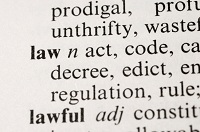 2013 was a light year for Notary-related legislation based on the number of bills introduced. But the bills that did pass were not light on substance. Of the approximately 170 bills that the NNA tracked throughout the year, 47 were enacted. The following are some key measures that went into effect on or before January 1, 2014.
2013 was a light year for Notary-related legislation based on the number of bills introduced. But the bills that did pass were not light on substance. Of the approximately 170 bills that the NNA tracked throughout the year, 47 were enacted. The following are some key measures that went into effect on or before January 1, 2014.
Bills Of The Year: Several states took, passed and/or implemented the Revised Uniform Law on Notarial Acts (RULONA), including Oregon (HB 2834), Pennsylvania (HB 25)and Nevada (AB 99). RULONA is a model law created by National Conference of Commissioners on Uniform State Laws to serve as the basis for states to modernize and strengthen their Notary statutes. While the specific changes vary by state, the law updates, as a whole, help reinforce RULONA’s principal provisions, including those related to electronic notarization, and take a collective step toward the creation of uniform rules and practical guidelines for Notaries across the nation.
Business Opportunity Bill:
- Nevada AB 419: Notaries can now apply for permission with the county clerk to perform marriages in the Silver State.
Bills Related To The Unauthorized Practice of Law: Several new laws clarify the role — and limitations — of the Notary Public.
- Utah: Early versions of HB 47 called for signing agents to be licensed as escrow agents, but that provision was removed — a major win for signing agents. However, the new law stipulates that only escrow agents are permitted to explain documents.
- Connecticut: The unauthorized practice of law is now classified as a class D felony in Connecticut under SB 829. HB 5513 restricts Notaries from performing immigration-related notarizations that constitute unauthorized practice of law.
- Nevada: AB 74 permits Notaries to perform “document preparation services,” but they are prohibited from providing legal advice or services.
- California: Under AB 1159, it is now a misdemeanor for nonattorneys — including nonattorney Notaries — to translate the term “Notary” or “Notary Public” into other languages on advertising, business cards, or other documents.
Bills Designed To Prevent Notary Fraud:
- Illinois: HB 2269 extends until July 1, 2018, a requirement for Notaries to complete a Notarial Record form for all real property conveyance documents in Cook County. Notaries also may charge $25 for a notarization involving a Notarial Record.
- Arizona: Under SB 1094, individuals willfully impersonating a Notary will be penalized. Also, a seal vendor who fails to obtain and maintain a copy of a Notary’s commission prior to manufacturing his or seal can be charged with a class 6 felony.
Bills Related to Notary Commission and Bond Fees: Several states changed fee requirements for filing Notary commissions and bonds.
- Wyoming: HB 98 requires Notaries to pay $12 (up from $8) for filing the first page of a Notary bond or commission.
- Nevada: Under AB 192, Notaries will continue to be charged an extra $5 fee for filing their bond with the county clerk.
- Maryland: HB 102 permits clerks to charge up to $11 for a Notary commission, as prescribed by the Secretary of State.
- Alabama: HB 630 adds a $5 surcharge for filing a Notary bond with the probate court in Fayette County.
Bills Involving Elected Officials:
- North Carolina: Under HB 332, Notaries no longer need the endorsement of a publicly elected official in order to be commissioned.
- Maryland: SB 190 maintains the requirement for Notary applicants to be endorsed by an elected official, but a state senator may now delegate the responsibility of candidate endorsement to the Secretary of State.
Bill Related To Citizenship:
- Virginia: HB 2055 removes the requirement for Notaries to be U.S. citizens, but they must be legal residents. Virginia was one of the last states to maintain the formal requirement, despite an U.S. Supreme Court decision in 1984 striking down state laws requiring citizenship.
Redundant Bill Of The Year: A California bill (AB 35) prohibiting Notaries for “price-gouging” immigrants seemed superfluous, given the existing statute establishing maximum Notary fees. Still, it serves as a useful reminder to Notaries to keep their fees in check.
Most Unusual Bill of the Year: Thanks to AB 924, California Notaries will now find their commission suspended or revoked if they are found to be involved in the theft of cattle, horses, or other farm animal carcasses. Apparently, barnyard thievery presented a very serious financial loss for California farmers — more than $1 million in losses last year alone.
Kelle Clarke is a Contributing Editor with the National Notary Association.